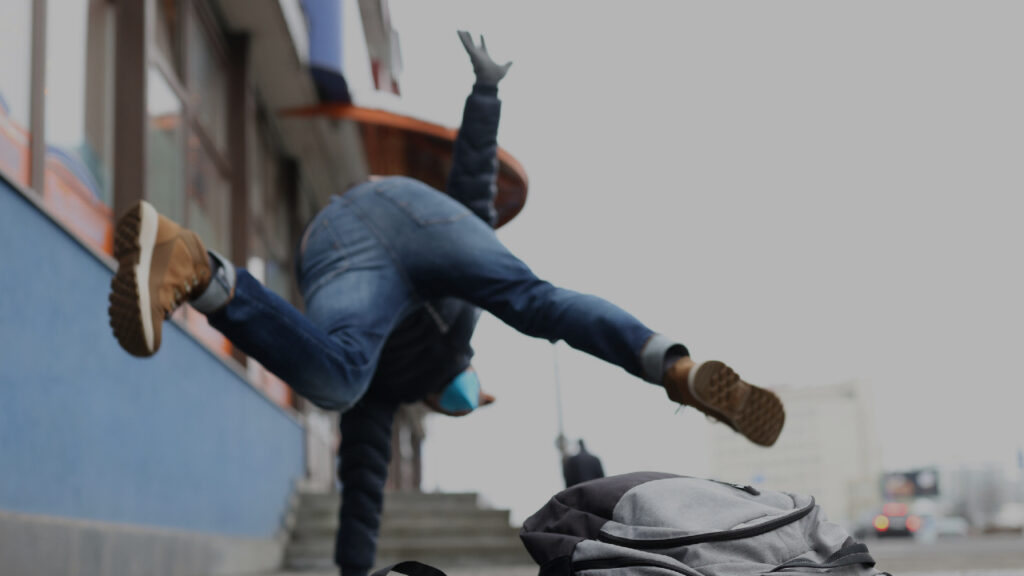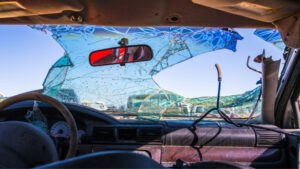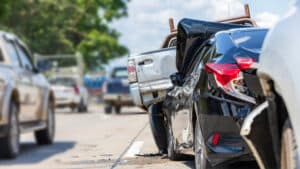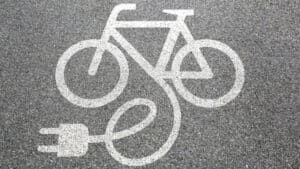Written By Chris Dolan and Anna Pantsulaya
This week’s question comes from Mark in Oakland, who asks: I read your article last week on Store-front crashes and was surprised by the 7-Eleven statistics of car crashes into the store, one per day! A few weeks back, when it was raining, my friend and I were inside the convenience store, and he slipped. His feet rose in the air, and he landed on his lower back. He seems to be okay. Are business owners responsible for slip-and-falls on rainy days?
Hello Mark,
Thank you for your question. With California’s unprecedented rain, your concerns about slip-and-fall as a business invitee are not without.
What is a slip-and-fall claim?
A “slip-and-fall” is a type of California premises liability claim that occurs when someone falls and sustains an injury due to the owner or operator’s negligence. Not all falls lead to slip-and-fall liability. Slip-and-fall accidents regularly lead to broken bones, traumatic brain injuries, sprains and strains, scars, and lacerations. Slip-and-fall accidents can even cause death in the most severe cases. Slips, trips, and falls cause over 700 fatalities and other severe injuries yearly and are responsible for over 50% of all accident-related deaths. According to the CDC, one of every five slip-and-fall accidents results in a broken bone or head injury.
There are also different considerations to make depending on what caused the slip-and-fall to occur. Common causes of slip-and-fall liability in California include:
- Wet floors,
- Spills,
- Leaks,
- Poorly maintained rugs or carpeting,
- Uneven/defective floors,
- Lighting,
- Uncovered cables and cords,
- Broken or missing railings, and
- Failure to warn about known hazards.
Liability for Slip-and-fall:
In California, the law of premises liability places on property owners and managers a duty of care to:
- maintain their property in a reasonably safe condition, and
- warn guests and visitors of dangers that may not be obvious.
The duty of care requires people who own, possess, or control property to reasonably maintain their property, inspect for and repair potentially dangerous conditions, and give adequate warning when ownership still needs to correct the dangerous condition. The general rule is that to impose liability for injury to an invitee due to a dangerous condition, the condition must have been known to the owner or occupant or have existed for such time that it was the duty of the owner or occupant to have known of it.
But who do you file a claim with when such an incident occurs? Different insurance policies are applicable depending on when and where the slip-and-fall occurred. For example, if you slipped and fell in a store or other business, you can file a claim under the company’s commercial liability insurance coverage. If you tripped and fell at a neighbor’s house, you may be able to file a claim under their homeowner’s insurance policy. If you slip-and-fall while in the course and scope of employment, you must file a worker’s compensation claim through your employer.
Does a rainstorm affect slip-and-fall liability?
We all must watch where we are going. Although there may be liability on a property/business owner for slips-and-falls, that may not always be the case. Businesses often argue that a reasonable person has the wherewithal to appreciate the increased risk of slip-and-fall during rainstorms. Nevertheless, that same logic is used to show notice to the business of the need to maintain the areas that track in the most rain due to customer use.
In Scott v. Alpha Beta Co., 104 Cal. App. 3d 305, 163 Cal. Rptr. 544, 20 A.L.R.4th 511 (2d Dist. 1980), an action for damages sustained by a business invitee who, on a rainy day, slipped and fell in the grocery store immediately after stepping off of a rubber mat. The court found the grocery store 60% negligent and the injured party 40% negligent. It held that the evidence was sufficient to allow the jury to conclude that the grocery store knew of the slippery condition of its floor and had failed to take reasonable precautions. Noting that it was raining at the time of the accident and had been doing so all day and that the grocery store had approximately 2,000 customers per day, the court explained that it knew or should have known that the floor would become wet.
This case highlights the responsibility of businesses to keep patrons reasonably safe from harm but also demonstrates that courts do consider the negligence of the patron when evaluating the extent of the owner’s liability. Businesses will use many defenses to fight even the most obvious liability against them. That is why it is essential to immediately contact an attorney who has experience preserving and gathering evidence that is important to prove your claim.










